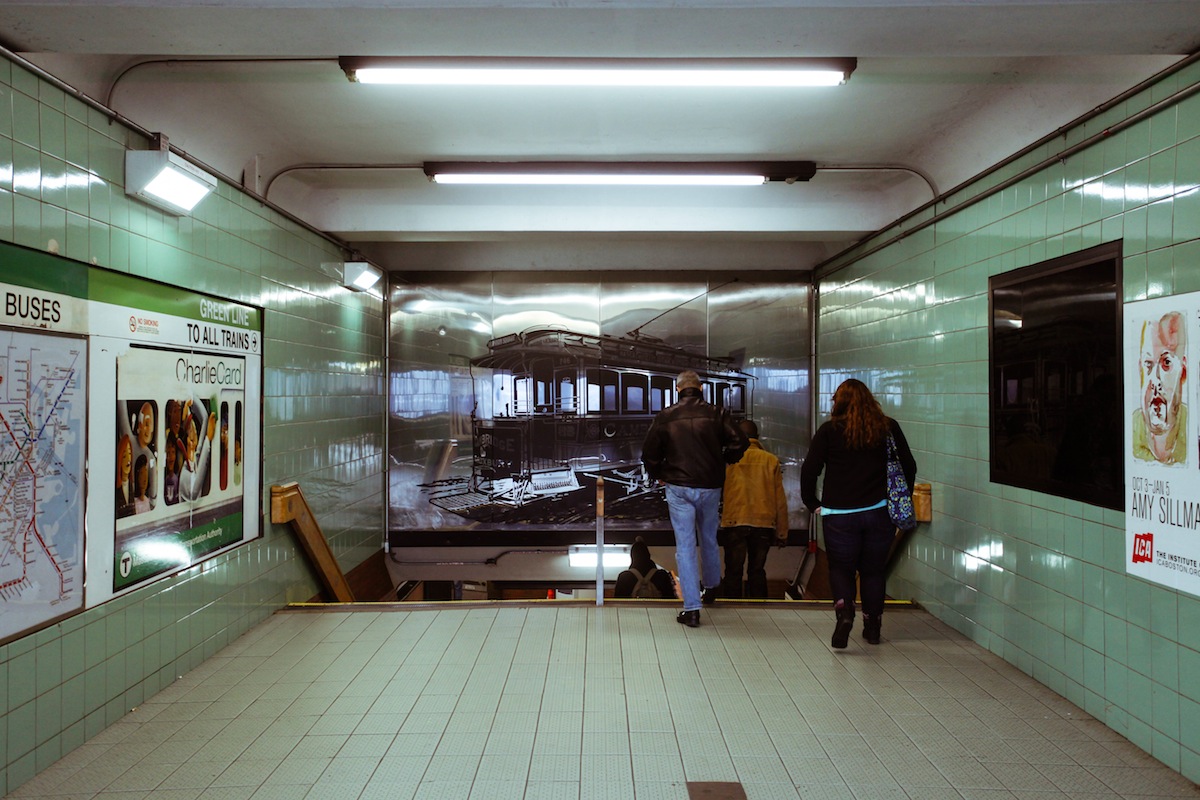State’s Highest Court Says Taking ‘Upskirt’ Photos on the MBTA Is Within the Law

Photo by Alex Lau
The “Peeping Tom” laws in Massachusetts only apply when people being photographed unknowingly are either nude or partially nude in places like dressing rooms, and do not cover those in public settings who are fully clothed but may be exposing part of their body, whether accidentally or intentionally.
That was the argument that the state’s highest court used when they sided with a defendant on Wednesday who said he didn’t break the law when he was caught taking “upskirt” photos of women on the Green Line in 2010. “We interpret the phrase, ‘a person who is … partially nude’ in the same way that the defendant does, namely, to mean a person who is partially clothed but who has one or more of the private parts of body exposed in plain view at the time that the putative defendant secretly photographs her,” Supreme Judicial Court judges ruled this week. “A female passenger on an MBTA trolley who is wearing a skirt, dress, or the like covering these parts of her body is not a person who is ‘partially nude,’ no matter what is or is not underneath the skirt by way of underwear or other clothing.”
The ruling stemmed from charges against 31-year-old Michael Robertson, who brought his case to the Supreme Judicial Court after a Boston Municipal Court judge denied his appeal to drop charges from the 2010 incident. Robertson was accused of taking pictures up two women’s skirts, including an MBTA Transit Police decoy.
In backing Robertson, the Supreme Judicial Court reversed the order of the lower court blocking his motion to dismiss those charges. “Because the MBTA is a public transit system operating in a public place and uses cameras, the two alleged victims here were not in a place and circumstance where they reasonably would or could have had an expectation of privacy,” the court ruled, citing the state law and how it’s written. “[Parts of the law] do not apply to photographing (or videotaping or electronically surveilling) persons who are fully clothed and, in particular, does not reach the type of upskirting that the defendant is charged with attempting to accomplish on the MBTA.”
Judges said the state will need to update the language in the existing “Peeping Tom” laws to reflect issues presented like those in Robertson’s case. In the past, state elected officials have tried to push through such language, and another effort to get the law in place will have to be made.
Sen. Katherine Clark submitted legislation on Beacon Hill to refine the language of the “Peeping Tom” laws to make them less ambiguous. In her proposal, Clark recommended adjusting the wording in the current state law so that it reflects technological changes such as the use of cameras on phones, and increases fines for those convicted of violating the law. Clark also wanted to include the words “intimate area” to the state’s law, so that even body parts covered by clothing—like underwear—would be protected. That definition would cover “human genitals, buttocks, pubic area, or female breast below a point immediately above the tip of the areola, whether naked or covered by undergarments.”
In response to the ruling, the Suffolk District Attorney’s Office said they would work hard with the legislature to make sure the appropriate language was in place to avoid theses types of situations moving forward, and ensure rider privacy. “We argued against a dismissal in this case because we believe the statute covered this behavior. Since the high court found otherwise, we’re urging the Legislature to act with all due haste in amending the statute to protect every person’s right to privacy under his or her own clothes,” said Jake Wark, spokesman from the Suffolk DA’s Office.
Senate President Therese Murray said she was “stunned and disappointed” by the ruling. “We have fought too hard and too long for women’s rights to take the step backward that they did today. I am in disbelief that the courts would come to this kind of decision and outraged at what it means for women’s privacy and public safety in the Commonwealth.,” she said. “I will speak with the members tomorrow in caucus and the Senate will act swiftly. Massachusetts is better than this.”
House Speaker Robert DeLeo echoed Murray’s outrage, and said elected officials on Beacon Hill will waste no time fixing the current law. “The ruling of the Supreme Judicial Court is contrary to the spirit of the current law. The House will begin work on updating our statutes to conform with today’s technology immediately,” he said.
MBTA Spokesman Joe Pesaturo said the T stands behind the DA’s position, and the legislature’s promise to update the law. “MBTA Transit Police support the Suffolk DA’s efforts to work with the legislature in rewriting the statute,” he said in an email.
Gina Scaramella, executive director of the Boston Area Rape Crisis Center, said “upskirting” is sexual harassment, something her organization worked hard with the MBTA to curb through a public service announcement campaign that has garnered national attention. “The law has an important purpose in defining for society what is, and is not, appropriate or harmful. This is clearly a case where the law needs to catch up to technology and intent since reasonable people would feel that this behavior of ‘upskirting’ is a violation and should not be permissible in any setting,” she said. “This would be a form of sexual harassment.”

